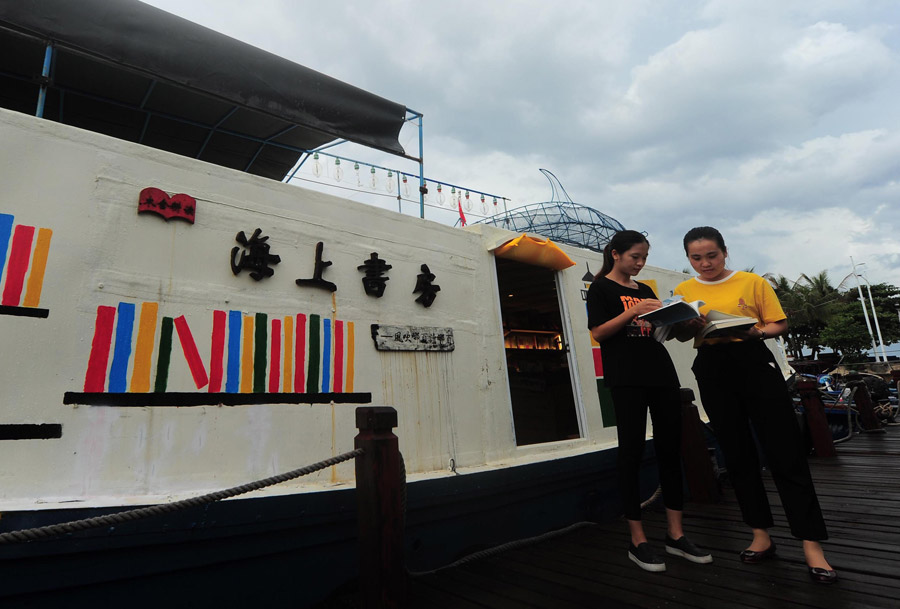Entrepreneur keeps love of reading afloat
chinadaily.com.cn | Updated: 2018-08-01 09:20

Three boats linked by ropes and docked off the coast of Sanya, Hainan province, are loaded not with nets, tackle or flopping fish-but instead are filled to the gills with books.
Holding over 3,000 paperbacks and hardcovers, the disused boats form a floating library on West Maozhou Island.
The library was founded by Qin Jiayi in August, 2017, and is free to use for the 4,000 residents and tourists.
"As fishing near shore has been gradually facing more restrictions and outright bans, many boats were abandoned and would typically have been destroyed," Qin said.
Before some boats were reduced to firewood, their owners took photos with them as a way to say goodbye to their "home" and a traditional lifestyle making a living at sea.
"It dawned on me that boats and life on the sea are their past, and therefore difficult to let go," Qin said.
To preserve the boats and local culture, she decided to turn several disused fishing boats into a library because "books and boats have close connections with culture".
With local government support, a ship cabin was renovated into a reading room, and large iron pots once used to hold fish now contain books. Old wooden hulls and gunwales have also been crafted into bookshelves, while rudders, nets and compasses serve as decor for the floating library.
Qin's love of books started in childhood. She grew up in a small village where few books were available, so she cherished them.
When she was a child, she was assigned a daily task of herding cattle. "It was my favorite chore because I had lots of time to read on the mountain," she said. "I can't resist the charm of books."
In 2011, Qin opened her first bookstore on a bustling street in Haikou, the capital of Hainan, and then two more in rural regions.
"Many people laugh at me and think I'm addicted to opening bookstores. Few people like to run brick-and-mortar bookstores now," she said.
Bookstores are struggling, losing out to digital reading and online shopping. According to the All China Federation of Industry and Commerce, about half of the private bookstores in China closed between 2004 and 2014.
Last year, the average monthly revenue of each of Qin's bookstores was less than 3,000 yuan ($460), not enough to cover the rent.
However, Qin is always looking for ideas to allow her businesses to survive.
The island province of Hainan, with its palm-lined beaches, picturesque fishing villages and balmy climate, is a top tourist destination. So, Qin started promoting a "traveling while reading" business project.
She converted one of the boats for the floating library into an inn with eight beds and charges tourists 199 to 299 yuan a night, which includes free access to the library.
Meanwhile, she and her partners have created products such as bookmarks, bookracks and schoolbags to encourage tourists to open their wallets.
The floating library has transformed the lives of residents. Many students can be seen taking advantage of the free reading opportunities.
"That is the meaning of our existence," Qin said. "I believe that reading, like eating and drinking water, will one day become an indispensable habit in our daily lives."
























